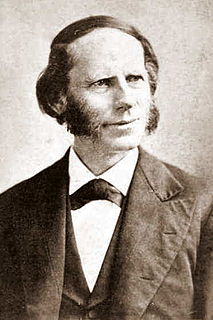A Quote by Joseph Addison
An honest private man often grows cruel and abandoned when converted into an absolute prince. Give a man power of doing what he pleases with impunity, you extinguish his fear, and consequently overturn in him one of the great pillars of morality.
Related Quotes
For a man's property is not at all secure, though there be good and equitable laws to set the bounds of it, between him and his fellow subjects, if he who commands those subjects, have power to take from any private man, what part he pleases of his property, and use and dispose of it as he thinks good.
You can graduate a man's progress in religion by the amount of prayer, not by the number of hours perhaps, but by the earnest supplication that he puts up to God. There is no exception to the rule. Show me a man who prays and his strength and his power cannot by exaggerated. Just give to a man this power of prayer and you give him almost omnipotence.
By Liberty I understand the Power which every Man has over his own Actions, and his Right to enjoy the Fruits of his Labour, Art, and Industry, as far as by it he hurts not the Society, or any Members of it, by taking from any Member, or by hindering him from enjoying what he himself enjoys. The Fruits of a Man's honest Industry are the just Rewards of it, ascertained to him by natural and eternal Equity, as is his Title to use them in the Manner which he thinks fit: And thus, with the above Limitations, every Man is sole Lord and Arbitrer of his own private Actions and Property.
An interesting example is that the worst woman in the book, who is so cruel and violent, is the sorceress in "The Prince of the Black Islands." She's a beautiful young woman, and she has turned her husband into stone from the waist down. A traveling sultan finds him, in his dreadful state, and the man petrified from the waist down tells his sad story...how his wife comes every afternoon and beats him until the blood runs down. She's just unwontedly, arbitrarily cruel.
A man follows the path laid out for him. He does his duty to God and his King. He does what he must do, not what pleases him. God's truth, boy, what kind of world would this be if every man did what pleased him alone? Who would plough the fields and reap the harvest, if every man had the right to say, 'I don't want to do that.' In this world there is a place for every man, but every man must know his place.
Many a man renounces morals, but with great difficulty the conception, 'morality.' Morality is the 'idea' of morals, their intellectual power, their power over the conscience; on the other hand, morals are too material to rule the mind, and do not fetter an 'intellectual' man, a so-called independent, a 'freethinker.'
No technological achievements can mitigate the disappointment of modern man, his loneliness, his feeling of inferiority, and his fear of war, revolution and terror. Not only has our generation lost faith in Providence but also in man himself, in his institutions and often in those who are nearest to him.
It is a fair adornment of a man and a great convenience both to himself and to all those with whom he converses and deals, to act uprightly, uniformly, and consistently. The practice of piety frees a man from interior distraction and from irresolution in his mind, from duplicity or inconstancy in his character, and from confusion in his proceedings, and consequently securing for others freedom from deception and disappointment in their transactions with him.
A man's a man for a' that. . . . . A prince can mak a belted knight, A marquis, duke, and a' that; But an honest man's aboon his might, Guid faith he mauna fa' that! . . . Then let us pray that come it may, As come it will for a' that, That sense and worth, o'er a' the earth, May bear the gree and a' that. For a' that, and a' that, It's comin' yet, for a' that, When man to man, the world o'er, Shall brithers be for a' that.






































